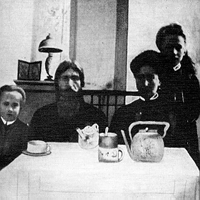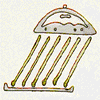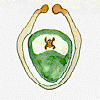 |
 |
|
|---|---|---|
 |
||
 |
 |
 |
An Interview with Andrej Blatnik
from The Dominion Review
|
Andrej Blatnik, born 1963 in Ljubljana, works as an editor. He played bass
guitar in a punk band and travelled Japan supported by a government
grant. He has published a novel, Torches and Tears (1987), and three books of short
stories: Bouquets for Adam Fade (1983), Biographies of the Nameless
(1989), Skinswaps (1990). He has authored several radio dramas and translated
American literature (Anais Nin's Delta of Venus, Sylvia Plath's The Bell
Jar, Stephen King's Pet Sematary, etc.). His short stories have been
translated and published in English, German, French, Spanish, Italian,
Croatian, Serbian, Polish and Albanian. This interview took place at the International Writers Center, where Andrej Blatnik lived during his residency at Old Dominion University. Ron Brooks conducted the interview.
Andrej Blatnik: Ja, speaking of censorship probably was a 'hot' subject in the times of the cold war but in times when the wars themselves are 'hotter' and 'hotter,' political censorship seems to me a relic of history. In the times when the world was divided between two solid (and very different) blocs and the third world, the writers in Eastern Europe were in a flattering position: their states were interested in what they were doing. This was a kind of censorship that was, of course, repressive but also easy to handle. To put it perhaps overdramatically, a writer knew exactly who the 'enemy' was. No doubt this 'enemy' was the source of many problems for their personal life but, on the other hand, it brought them a lot of public attention they nowadays seem to lack. DR: So writers who wrote against the regime were read more than writers now? AB: No, it was not as if their work was being read, it was just that these people were known as writers, as public figures who opposed the regime. Now, because everyone has the right to say what he or she wants, writers have lost that attention. Writers now are under the pressure of having to express themselves solely on the basis of their writing alone. This so-called freedom has proved to be an irony: before there was censorship_everybody fought against it_and literature was one of the rare voices of otherness, of difference, but now it seems that these times of 'great stories', of ruling ideologies which are to be fought against, are over, and the so-called Eastern European literature, strangely enough, seems to find itself in an empty, vast space. DR: What kind of writing is emerging in Slovenia, now that politics are not the central focus? AB: Readers now have a chance to compare their works to foreign writings. People are now reading work from Europe and America, which in the past was very hard to get. Being part of this world market, other kinds of books are easier to come by. For example, writers are now experimenting with the horror and crime genres. DR: So there was no genre fiction under the regime? AB: Well, we didn't have popular genres such as crime fiction because we didn't have the right environment for that. For example, our capital has only three hundred thousand people, so there wasn't that much crime. But we had these novels where people were farmers and they lived a tough life on their farms. . . a sort of Slovenian best-seller. DR: Has this increase in genre fiction made the struggle for serious writers of fiction more difficult? AB: Ja, we now have to fight for an audience, but it's a different kind of fight in Slovenia. Our economic censorship is more complex than censorship of the regime. Books are now a product to be sold at free market, which is not convenient for any kind of writing, but to a lesser degree in Easten Europe because our markets are too small. In Slovenia we sell most of the time three hundred copies of a book of poetry and five to eight hundred copies of a work of fiction. A best-seller would be anything going at a thousand. DR: Is there a Slovenian equivalent to the NEA? AB: No, this is another problem. While the system of grants, funding, literary exhanges, etc., which is a solid support to the uncommercial writing in the West, hasn't really started to function in Central and Eastern Europe and while the publishing houses are still trying to decide whether to publish books and go bankrupt or trade plastic dinosaurs and make a fortune, being a writer is not the best career opportunity. DR: So, if that is the case, is translation the greatest market for your work? AB: Well, a larger market possibly, but I wouldn't say a greater one. Most of the writers from Eastern Europe who are known in the USA or in the West in general are known as the victims of a regime: communism, lack of freedom, or censorship. This is also the reason they are published in the West. Their capability to write a story or a poem seems to be of minor importance. Sometimes it looks like the general aspect is: if you weren't imprisoned in your home country, your writing can't really be important. DR: But certainly it is important, to put it in popular terms, to hear the voices of people who have been silenced due to their political beliefs. AB: Ja, but someone ironic or cynical enough would say that the West is expressing a certain voyeurism on that point: the world that does not know much about suffering will import it from the countries that have a surplus. It's easy to submit yourself to the general demand and repeat the repression episodes from someone's life again and again (or even make them up; writers should have imagination!) in order to get a few seconds of public attention (which is very hard to get nowadays), but it is much more difficult to explain the difference between the two systems in words other than black-and-white oppositions such as democracy and tyranny, freedom and repression, etc., let alone to capture or even to explain the differences of one person, the passions and desires that move the world and lead eventually to the historical events we are used to categorizing as political. DR: But in your work, the political atmosphere seems to show up in more subtle ways. AB: This is true, but this didn't occur to me until I left the country. I didn't start writing until the early seventies when the situation in Slovenia was quite westernized. Some details in my stories didn't appear to me to be influenced by the political situation I was in until I came back and looked at them later. For example, in my story "His Mother's Voice"_a sort of parody of the horror genre_I used an electrical blackout to create an atmosphere conducive to that genre. These shortages were common to any Slovenian reader and did not need explanation. However, when I read this story in Spain, many people thought the blackout was an unusual occurrence. DR: You write a lot of short short stories which seem to approach the level of the prose poem. Is your approach to the short short story different than it is to a longer work? AB: Ja, it is definitely different. In longer works you try to have an atmosphere closer to real life. There is more space for dialogue, which lends itself well to humor, for example. But in my short short stories there is much more concentration_or trying to explore a concentrated moment of time, like the moment when a secretary says to you on the phone "hold on." These moments have their own atmospheres, and those atmospheres are what I try to create.
|